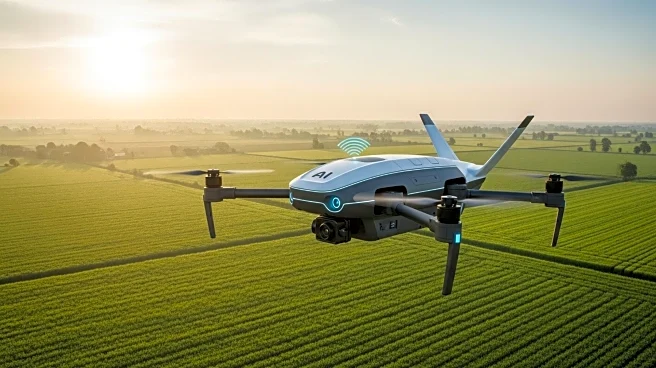What is the story about?
What's Happening?
Artificial Intelligence (AI) is poised to significantly impact agriculture and rural life, marking the fourth industrial revolution. The integration of AI into agriculture promises to increase crop yields by 15-20% annually, transforming production efficiency and socio-economic conditions in rural areas. However, the effects of AI could vary widely, from negative scenarios where rural communities face job losses and environmental degradation, to positive outcomes with improved labor markets and environmental sustainability. The introduction of AI in agriculture could generate substantial economic benefits, potentially increasing agricultural GDP in low- and middle-income countries by 27%. Despite these prospects, rural communities face challenges such as digital inequality and biased algorithms, which could affect their ability to control the situation.
Why It's Important?
The integration of AI into agriculture holds significant implications for U.S. rural communities and the agricultural industry. On one hand, AI could enhance productivity and sustainability, offering new opportunities for small farms and improving environmental practices. On the other hand, it could lead to job displacement and increased power concentration among large corporations, potentially reducing diversity in agricultural practices. The economic impact is substantial, with AI potentially contributing trillions to the global economy. However, the success of AI integration depends on political actions and regulations to ensure equitable benefits and address digital inequalities. The future of rural communities will largely depend on how well politicians manage the balance between AI developers and farmers.
What's Next?
The future of AI in agriculture will depend on political decisions and regulatory frameworks. Governments are exploring different approaches, such as the AI Assurance Framework in Australia, to assess AI's safety and impact. In the U.S., practical recommendations for AI implementation in rural communities have been published, emphasizing community engagement and pilot projects. The development of AI in agriculture will require collaboration between governments, tech companies, and rural stakeholders to ensure equitable and sustainable outcomes. As AI continues to evolve, rural communities must remain engaged with political processes to influence the integration of AI in ways that benefit them.
Beyond the Headlines
The integration of AI into agriculture could lead to profound cultural and social changes in rural communities. As digital agriculture becomes more prevalent, farmers may lose their traditional connection to the land, potentially affecting their sense of identity and independence. This shift could weaken social ties and cultural heritage, leading to changes in rural lifestyles. Additionally, the digital divide and data privacy concerns could exacerbate inequalities between different rural areas. Addressing these issues will require careful consideration of ethical and cultural dimensions, alongside technological advancements.















